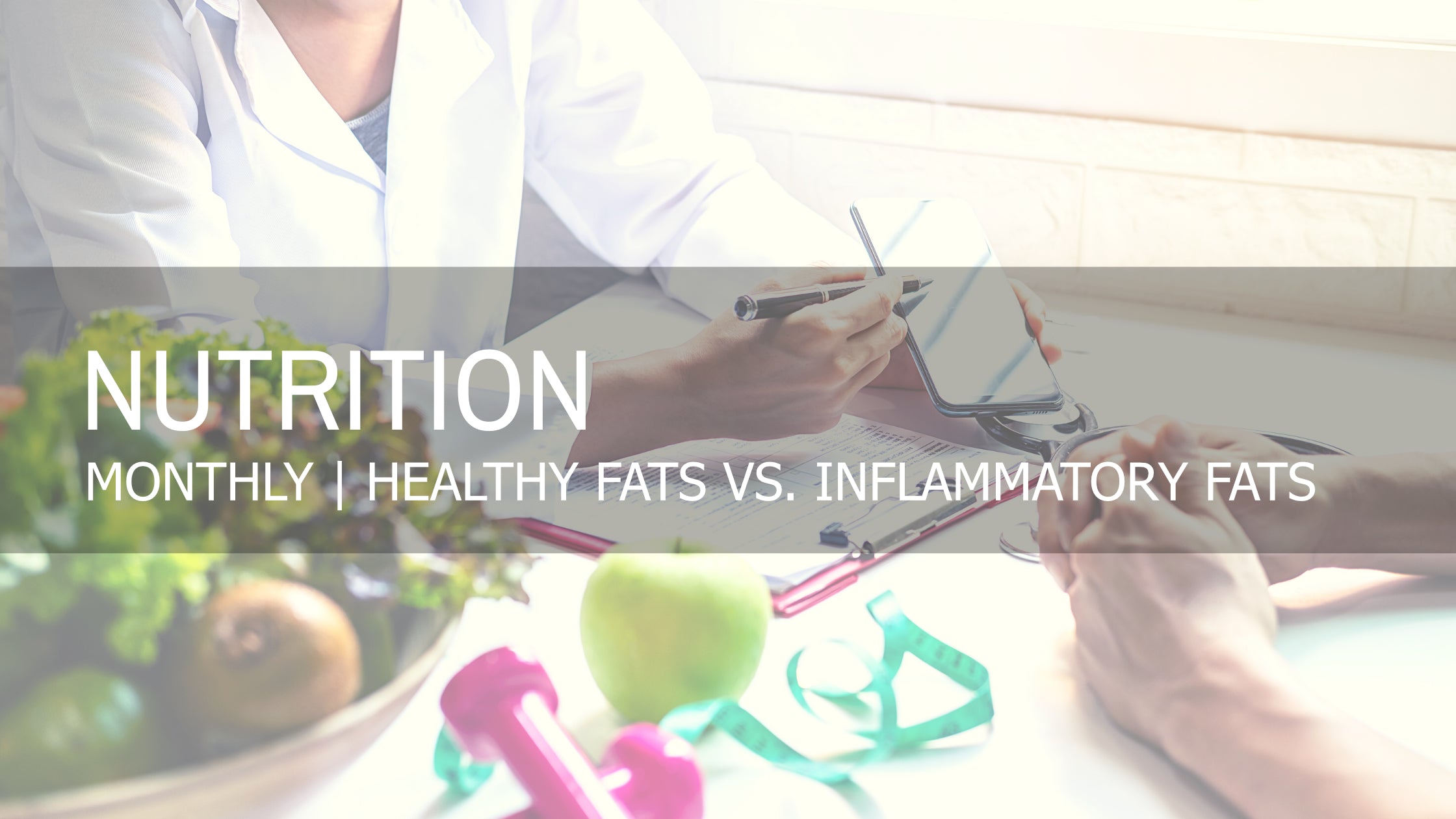
Aug 20 , 2021
0 Comments
Nutrition Monthly | Healthy Fats vs. Inflammatory Fats
Healthy Fats vs. Inflammatory Fats
We all hear about how chronic inflammation can be influenced by infections, injuries, and different health conditions like heart disease and diabetes, but did you know what you’re eating may also contribute to inflammation? Symptoms of chronic inflammation may include muscle aches and pains, poor digestion, skin rashes, headaches, excess mucus production, or low energy levels with fatigue. There are a variety of commonly consumed foods that are known to contribute to inflammation, this article will specifically discuss dietary fats. What are the dietary fats that could contribute to inflammation and what are the dietary fats that are considered anti-inflammatory?
What are Dietary Fats?
Fats are a macronutrient which is consumed daily in your diet. Including fat in your diet is important since it helps your body absorb vitamins, can keep our skin healthy, influences cholesterol, heart health and brain health, and serves as a nutrient that can help keep everyone satisfied after a meal. There are two different types of fats: saturated and unsaturated. Consumption of excessive saturated fat has been shown to contribute to high cholesterol, heart disease, and strokes. While unsaturated fats have been shown to be the healthier options for better health outcomes. Ideally it is recommended that saturated fats be limited to 10% of your total calories which is about 15-20 grams per day.
Healthy Fats vs Inflammatory Fats:
In this section, healthy fats are referred to as “anti-inflammatory” fats which means they typically do not cause inflammation. These healthier fats are the unsaturated fats called monounsaturated and polyunsaturated. These two types of unsaturated fats have been shown to reduce inflammation when eaten instead of saturated and trans fats.
As for the polyunsaturated fats try to consume more Omega-3’s. The correct balance of omega 3’s compared to Omega 6 ‘s can be beneficial to fight inflammation. Excess consumption of Omega 6’s can trigger the body to produce pro-inflammatory chemicals. The typical American diet tends to be very high in Omega 6’s – they don’t necessarily need to be avoided but you don’t want them to dominate your intake. Avoiding trans fats has recently been advised. Trans fats used to be highly prevalent in foods like processed meats, snacks, and margarines. In recent years trans fats have been associated with heart disease so the amount of trans fats has been limited and fortunately are now found less often in our foods.
Some oils like coconut oil or canola oil have 2 sides to their story on whether or not they might be healthful or not for a person individually. Coconut oil does have some anti-inflammatory properties but if used with a diet that is already too high in saturated fat it can end up tipping the scale towards inflammation. The health benefits of using Canola oil has also been challenged due to being chemically processed and often genetically modified. The topic of GMO’s is a great debate and for another time – but if you are wanting the low saturated easy cooking benefits of a Canola oil without any potential downsides, look for organic or non-GMO Canola brands… or until larger, better-quality studies are available, it may be best to choose oils that have been proven healthy - such as olive oil instead.
Here is a snapshot of how some of the fats measure up:
|
Anti-Inflammatory Fats: |
Inflammatory Fats if Excessive: |
|
Avocado (Monounsaturated Fat) Olive Oil (Monounsaturated Fat) Avocado Oil (Monounsaturated Fat) Salmon (Omega-3) Tuna Fish (Omega-3) Nuts (Omega-3) Flax (Omega-3) |
Peanut Oil (Omega-6) Pizza (Saturated Fat) Donuts / Processed Treat Foods (Trans Fats) Corn & vegetable Oils (Omega-6) Safflower, Soybean, Sunflower Oils (Omega 6) Excess Butter (Saturated Fats) Shortening or Lard (Saturated Fats) Most Restaurant Fried & Breaded foods (all) |
Ways to reduce saturated and trans fats:
- Eat more whole foods (Fruits, vegetables, grains, etc.)
- Eat more fish (Omega-3’s).
- When cooking beef, try to use 90/10 or lower fat content.
- Bake, broil, or grill foods instead of frying them.
- Replace whole milk with reduced fat milk.
- When making dips with sour cream, use non-fat Greek yogurt instead.
- Instead of snacking on chips try fruits of vegetables.
- Use liquid cooking oils instead of shortening or butters.
What can you do today?
The main point of this article is to encourage you to limit saturated and trans fats by replacing some of those sources with the unsaturated and Omega 3 fatty acid examples above. Make smart food choices that include eating more whole foods, using cooking oils, eating less fried foods, eating less processed foods, and eating more fish throughout the week.
Below is a table with one side higher in trans and saturated fats and the other side a better option with less saturated and trans fats. See if you can make some of these healthy trade-offs.
|
Fried chicken French Fries |
Baked or Air-fried chicken Baked potato or baked French fries |
|
Chips with Sour Cream and Onion Dip |
Whole wheat crackers with French onion dip made with Greek Yogurt |
|
Chocolate Ice Cream Bar for dessert |
Chocolate Greek Yogurt Bar |
|
Cooking with butter or shortening |
Cooking with avocado oil or olive oil |
|
Packed Trail Mix From the store (raisins, cashews, chocolate m&m’s) |
Homemade Trail Mix (Walnuts, dark chocolate, dried cranberries) |
|
Green Salad with Ranch Dressing |
Green Salad with Balsamic Vinaigrette |
|
3 Fried Eggs in butter with fried bacon |
3 eggs cooked in avocado oil with baked bacon |



